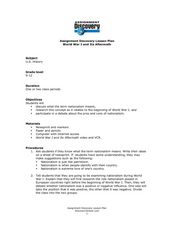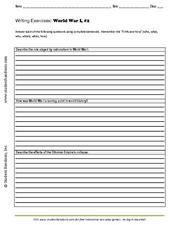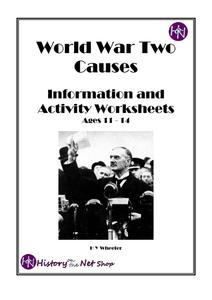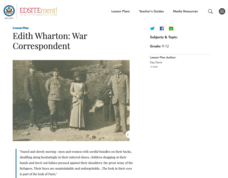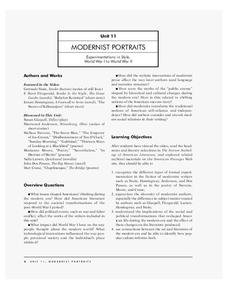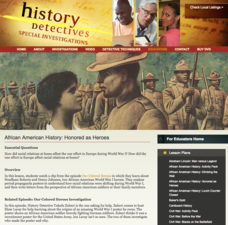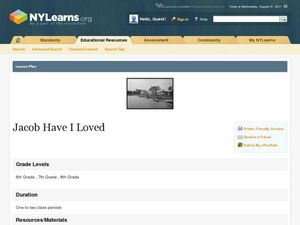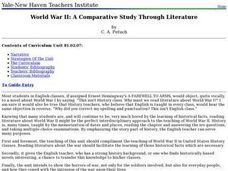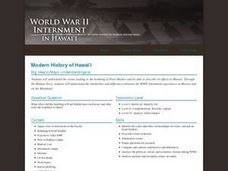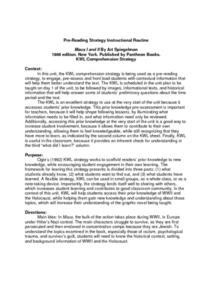Curated OER
World War I and Its Aftermath
Students examine World War I and its consequences. In this World War I lesson, students watch the Discovery video "World War I and Its Aftermath." Students then research how nationalism contributed to the spread of the war...
Curated OER
Writing Exercises: World War I, #2
In need of three good writing prompts focused on World War I? Learners respond to three prompts, each having them examine an aspect of World War I. They describe the role nationalism played in the war, the impact of the fall of the...
Curated OER
The Balkans and World War I
Students review the causes of World War I and draw timelines of the 1914 events. They conduct Internet research to discover the role of the balkans in the war and how it spread to a worldwide conflict. Students then research the recent...
Curated OER
Paris Peace Conference: Writing a Treaty to End World War I
How did World War I end? Tenth graders role play as experts from countries that were involved in World War I. They write a treaty to end the war and compare it to the Treaty of Versailles.
H Y Wheeler History on the Net
World War Two Causes
If you're searching for a range of activities and worksheets on the subject of the onset of World War II, then this is the booklet for you. Featured topics include the signing of the Treaty of Versailles, Hitler's rise to power, the...
Curated OER
Writing Exercises: World War I, #3
What does your class know about WWI? They can share their knowledge by responding to three short-answer questions. They'll discuss human rights issues during WWI, the role of imperialism, and causes of the war from the perspective of the...
Poetry Society
War Horse and WWI Poetry
Here's a resource that deserves a place in your curriculum library. As part of their study of War Horse individuals create an anthology of World War I poetry.
Curated OER
Poetry of The Great War: 'From Darkness to Light'?
Students examine World War I poetry for historical context, poetic devices, and participate in a class discussion. They write an analysis of the poetry's form and its content.
National Endowment for the Humanities
Edith Wharton: War Correspondent
Students research how the field of war correspondence has evolved. Young historians read chapter's from Edith Wharton's book Fighting France, From Dunkerque to Belfort. Students investigate an American correspondents' experiences during...
Annenberg Foundation
Modernist Portraits
How did literature reflect people's attitudes in post-World War I America? A lesson explores the topic using a variety of activities. Individuals watch and respond to a video; read author biographies and engage in discussion; write...
Curated OER
World War I Leaders: tracing
In this World War I leaders worksheet, students trace a sentence about the leaders in World War I. Students trace 8 lines total.
PBS
African American History: Honored as Heroes
To gain an understanding of the treatment of African American soldiers during World War I, class members watch an excerpt from the History Detectives film, Our Colored Heroes, and then examine three recruitment posters from that time...
Curated OER
Jacob Have I Loved
Students examine visual images about the novel, Jacob Have I Loved. They compare pictures from "America from the Great Depression to World War II" that are described in the book and other studies of the Chesapeake Bay. They present their...
Teaching English
In Flanders Fields
War is one of the most profound human experiences in history, and is often best depicted in works of art and literature. Introduce class members to the poetry of World War I with this resource that uses John McCrae's "In Flanders Fields"...
Curated OER
Poetry of War and Peace
Students read and discuss the poem "In Flanders Fields," then write poems evoking images of peacetime. They practice the techniques of writing poetry while using textual imagery to create visual images.
Curated OER
End of World War II
Ninth graders examine the results of the Yalta Conference on Europe after the war. They develop a PowerPoint presentation that compare the effects of World War I and World War II. They write a journal entry taking the point of view of...
Curated OER
World War II: A Compartive Study through Literature
Students examine World War II through the use of literature. As a class, they brainstorm a list of words they relate to the war itself. In groups, they read various novels and view photographs showing the experiences of the Jews,...
Roy Rosenzweig Center for History and New Media
War and Poetry
A band of brothers or the Devil's agents? Nobel warriors freeing the oppressed or mercenaries working for the military/industrial complex? Groups examine poems from the Civil War, World War I, and World War II to determine the poets'...
Curated OER
World War II: Modern History of Hawaii
Learners examine world geography by viewing a documentary film in class. In this World War II lesson, students discuss the role Hawaii played in the great battle and what type conflicts happened among the island chain. Learners view a...
Curated OER
What Qualities Does a Hero Have?
Study the characteristics of real-life heroes in your history or language arts lesson. After reading about the soldiers of World War I, kids write autobiographies from their future elderly selves, and reflect on their acts of heroism yet...
Curated OER
KWL Comprehension Strategy: Maus I and II
How much does your class know about World War II? Before reading Art Spiegelman's Maus I, lead your class in creating a KWL chart. Knowing the background and setting of the novel are extremely important in understanding this survivor's...
Curated OER
Maus I and II: Pictionary
Why is visual literacy so important in understanding Maus? Introduce your class to basic elements of graphic novels with a game of pictionary. A list of 13 words are included, but you could potentially add some World War II-related terms...
Curated OER
Vocabulary Strategy Instructional Routine: Maus I and II
Pogrom, schlepped, meshuga. Kapo, reich, Wehrmacht. As part of a unit study of Maus I and II, readers use a list-group-label (LGL) strategy for vocabulary drawn from Art Spiegelman's famous graphic novels. The focus of the activity is...
Worksheet Web
Analyzing the Text
Practice analyzing informational text with a reading passage that details the Great Depression. Scholars read about the impacts of World War I, the Roaring Twenties, and the Depression, then answer 10 true or false questions.
Other popular searches
- World War Ii
- World War I and Ii
- Causes of World War I
- Causes World War Ii
- World War Ii Map
- World War Ii Holocaust
- World War Ii Battles
- Post World War Ii
- Propaganda World War Ii
- Causes of World War Ii
- World War I Causes
- World War Ii Newspaper


